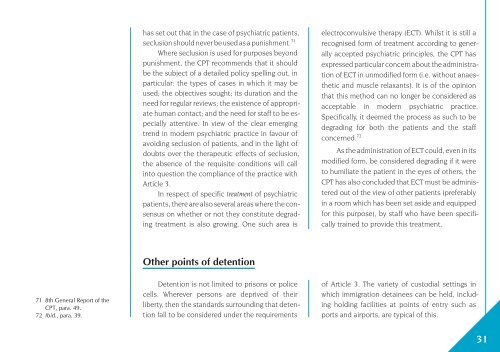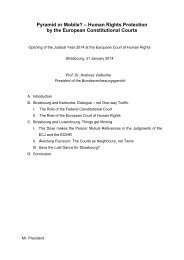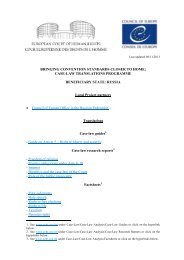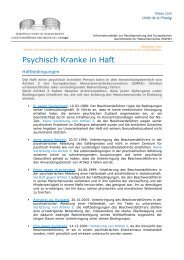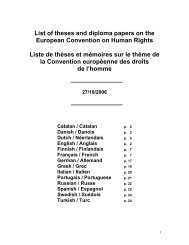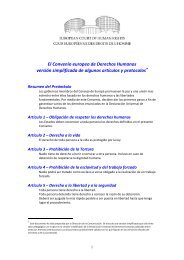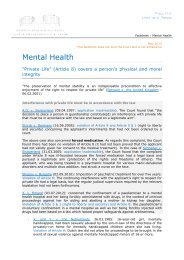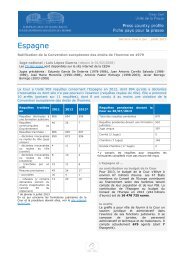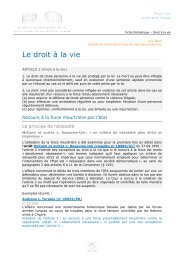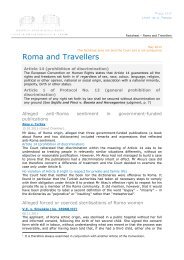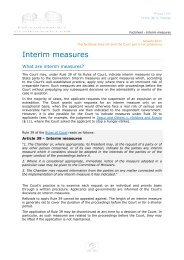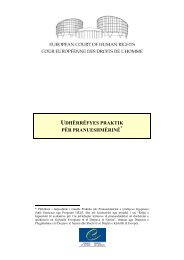The prohibition of torture - European Court of Human Rights
The prohibition of torture - European Court of Human Rights
The prohibition of torture - European Court of Human Rights
You also want an ePaper? Increase the reach of your titles
YUMPU automatically turns print PDFs into web optimized ePapers that Google loves.
has set out that in the case <strong>of</strong> psychiatric patients,<br />
seclusion should never be used as a punishment. 71<br />
Where seclusion is used for purposes beyond<br />
punishment, the CPT recommends that it should<br />
be the subject <strong>of</strong> a detailed policy spelling out, in<br />
particular: the types <strong>of</strong> cases in which it may be<br />
used; the objectives sought; its duration and the<br />
need for regular reviews; the existence <strong>of</strong> appropriate<br />
human contact; and the need for staff to be especially<br />
attentive. In view <strong>of</strong> the clear emerging<br />
trend in modern psychiatric practice in favour <strong>of</strong><br />
avoiding seclusion <strong>of</strong> patients, and in the light <strong>of</strong><br />
doubts over the therapeutic effects <strong>of</strong> seclusion,<br />
the absence <strong>of</strong> the requisite conditions will call<br />
into question the compliance <strong>of</strong> the practice with<br />
Article 3.<br />
In respect <strong>of</strong> specific treatment <strong>of</strong> psychiatric<br />
patients, there are also several areas where the consensus<br />
on whether or not they constitute degrading<br />
treatment is also growing. One such area is<br />
electroconvulsive therapy (ECT). Whilst it is still a<br />
recognised form <strong>of</strong> treatment according to generally<br />
accepted psychiatric principles, the CPT has<br />
expressed particular concern about the administration<br />
<strong>of</strong> ECT in unmodified form (i.e. without anaesthetic<br />
and muscle relaxants). It is <strong>of</strong> the opinion<br />
that this method can no longer be considered as<br />
acceptable in modern psychiatric practice.<br />
Specifically, it deemed the process as such to be<br />
degrading for both the patients and the staff<br />
concerned. 72<br />
As the administration <strong>of</strong> ECT could, even in its<br />
modified form, be considered degrading if it were<br />
to humiliate the patient in the eyes <strong>of</strong> others, the<br />
CPT has also concluded that ECT must be administered<br />
out <strong>of</strong> the view <strong>of</strong> other patients (preferably<br />
in a room which has been set aside and equipped<br />
for this purpose), by staff who have been specifically<br />
trained to provide this treatment.<br />
Other points <strong>of</strong> detention<br />
71 8th General Report <strong>of</strong> the<br />
CPT, para. 49.<br />
72 Ibid., para. 39.<br />
Detention is not limited to prisons or police<br />
cells. Wherever persons are deprived <strong>of</strong> their<br />
liberty, then the standards surrounding that detention<br />
fall to be considered under the requirements<br />
<strong>of</strong> Article 3. <strong>The</strong> variety <strong>of</strong> custodial settings in<br />
which immigration detainees can be held, including<br />
holding facilities at points <strong>of</strong> entry such as<br />
ports and airports, are typical <strong>of</strong> this.<br />
31


